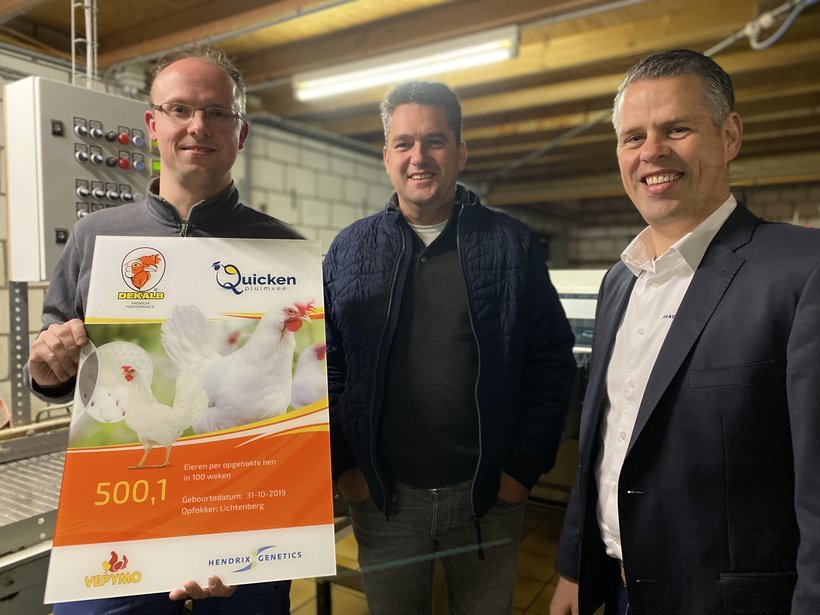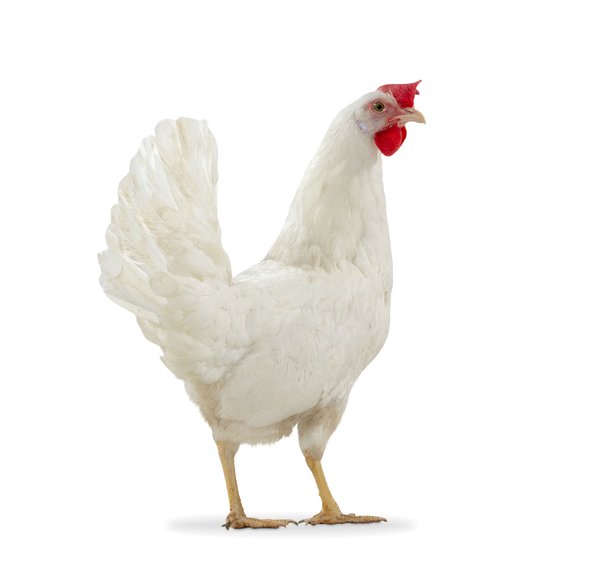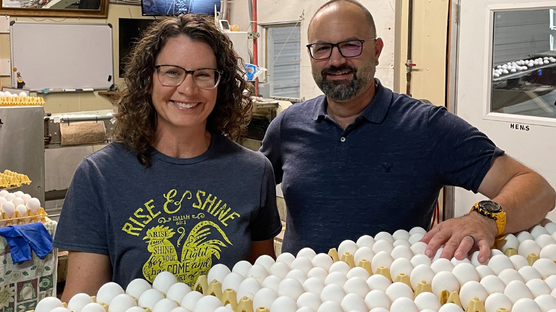
Published on Feb. 25, 2022
Reaching 500 eggs for the second time, it’s all in the details!
Just few years have passed since we visited the Quicken family to handover the first award of reaching the 500 eggs in 100 weeks. We were very pleased when we received the field results from his most recent flock that finished, once again Niels has been able to get the Premium Performance out of a flock of Dekalb Whites.
Since his first flock that reached this impressive milestones, new regulations with respect to beak trimming came into place and therefor it took some flocks to get back to the level Niels started off with. According to Niels, “Managing a bird with an intact beak requires even more attention from the egg producer. It’s all in the details, especially with intact beaks it is important to detect all the early warnings that the flock is giving you.” As Niels already mentioned in the previous interview, every detail counts! This already starts at the rearing barn. Niels buys 17-week-old pullets from Vepymo, one of the distributors in the Benelux. During the moment that the birds are being reared, Niels like to come over and visit the flock, preferably every 3 weeks, but logistically this can be a sometimes a challenge. By visiting the flock, Niels already can get used to the flock, and he knows what he can expect when the birds arrive. He monitors the rearing flocks also from a distance, at least on a weekly base, to see their development in bodyweight, the feed intake capacity, how they respond to the vaccination schedule, etc.
Whether a flock will be able to make it all the way up to 100 weeks of age, is already partly defined during the rearing period. Rearing chicks into good quality pullets is an investment, it should not be solely seen from the cost perspective. Getting the maximum out of the flock is the direct result of great teamwork, you need to rely on collaboration and communication of your partners along the chain: the hatchery, the pullet rearer, the pullet supervisors, the vet, the feed mills, sharing information between partners is key, in the end we all benefit when the egg producer is making money!
"Niels is very much focused on the details, as he says, “in a challenging market like we have in the Netherlands, where margins are so low, every extra egg counts. The breeding program of Hendrix Genetics Layers, to select the birds for better persistency is spot on, it helps me to improve the overall income for each hen that I have housed.”
Getting these results out of the flock is not just linked to the right choice of breed. Next to the breed, the barn climate is extremely important as well. Ventilation is often neglected, but the right ventilation helps to keep the birds comfortable, there is not perse a golden rule for that, but by spending a lot of time inside the barn, listening to the flock, and observing their behavior you can already tell a lot. And to be honest, sometimes it is just trial and error. Niels his advice: keep the changes simple, so you understand what you did do different, and take the time to see how the flock responds (and most often this does not change just overnight, so allow some time before you actually can see changes). It is also crucial to be consequent in your analyses and investing time and energy in trying to find answers when things do not go so smooth.
Quicken also started to formulate his own diets, it is some extra work, but at least it allows Niels to be in full control of what he is feeding his flock. Gut health is essential to keep your flock highly productive till 100 weeks of age. Making his own chicken feed helps Niels to focus on the key ingredients that he finds important for his flocks. Niels is not focusing perse on the lowest feed price, but in general on the highest return: a more expensive diet will lead to higher feed costs, but looking at the total picture it also gives me a healthy and productive flock and therefor a higher total return!
Every new flock that arrives in the laying house is a new adventure, when working with living creatures you need to stay focused. The nice thing is, you learn by doing, and you learn from your previous flocks. Also, with the legislation that is changing quickly, there is no time to sit down and relax, but luckily, I have a nice breed. The Dekalb White allows me to spend some time with my young family.”




